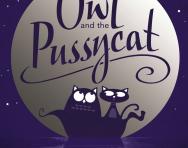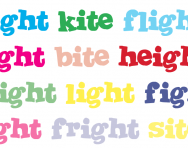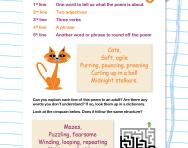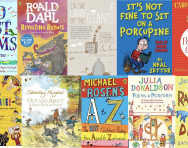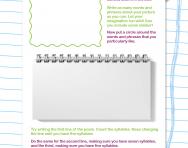9 ways to help your child love poetry

Whether it’s through the wise words of Oompa Loompas, the short limericks of Edward Lear or the classic tales of Dr. Seuss, poetry has long been used in children’s books as a way to communicate in a different, engaging style. Rhyming poems have a natural musical element that makes them easy to remember, while non-rhyming poems capture beautiful images in a way that a block of text might not be able to.
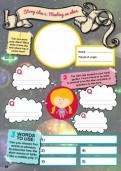
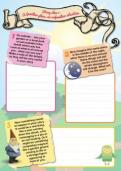
Download a FREE Creative Writing toolkit!
- KS1 & KS2 workbooks
- Bursting with fill-in prompt sheets and inspiring ideas
- Story structure tips, style guides and editing suggestions
National Poetry Day offers a great opportunity to help children engage with poetry and learn about what makes it different from other forms of writing. Focus on one or all of these three areas when you and your child talk about poetry.
Rhyming
- Liven up the daily walk to school or drive to the supermarket with some rhyming practice. Can your child think of rhymes for objects you see on your travels? The sillier, the better!
- Say a phrase to your child, and have them respond with a rhyming phrase.
- Challenge your child to speak in rhyme for an entire day – even it means making words up!
Imagination
- Have your child pick a word out of a hat, and describe the images and thoughts that come into their head when they read it out loud.
- Use magnetic poetry strips, or write single words on bits of paper to create free verse poems. Get the family together and take turns picking a word to add to a poem.
- Try writing different kinds of poems that have specific rules around them. For instance, haikus are three-line poems that have a certain number of syllables in each line – five, seven and five, respectively. Kennings enrich poetry using a two-word phrase in the place of a one-word noun. ABC poems use a sequential letter of the alphabet to start each line with – see how far through the alphabet your child can get. Or, stretch creativity with a shape poem, which is written about a shape, and looks like that shape!
Poets
- Help your child memorise a short poem – a great way to boost both their memory skills and their confidence.
- Pick out poems written centuries ago by poets such as John Donne, Lord Byron and William Blake, and compare them to poems written today (you can find recent poetry prize winners at The Poetry Society. Ask your child whether they notice differences in writing style, words used, etc.
- Read a collection of children’s poems out loud. Michael Rosen, Roald Dahl and Shel Silverstein are great child-friendly poets to start with, or you can borrow a treasury of verse from the library. The amazing Children's Poetry Archive lets you listen to famous poets reading their own work out loud, for free, or find videos of poets performing their work on YouTube.
Think you might have a budding poet on your hands? Inspire your child to write poetry themselves with our tips, or kick-start creativity with a practical poetry-writing activity.

Give your child a headstart
- FREE articles & expert information
- FREE resources & activities
- FREE homework help





